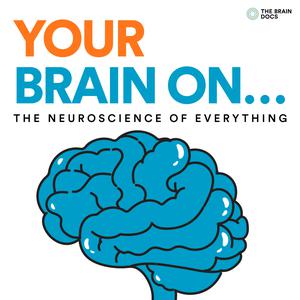
Your Brain On
Drs. Ayesha and Dean Sherzai
- 40 minutes 23 secondsYour Brain On... Hearing Loss
How does hearing loss change the brain and contribute to cognitive decline?
The human capacity to hear is incredible. In milliseconds, sound vibrations are transformed into mechanical energy, then sensorineural signals, and then, in our brains, a universe of meaning and memory.
When that sense begins to fade, either due to aging or because of causative damage, our brains can become understimulated, potentially leading to the onset of neurodegenerative diseases like Alzheimer’s.
But, with accessibility research, technology, and policy continuing to strengthen and converge, the future promises to be brighter for everyone experiencing hearing loss.
In this episode of ‘YOUR BRAIN ON...’, we discuss:
• The different kinds and causes of hearing loss
• The relationship between aging and hearing loss
• The neurological distinction between ‘hearing’ and ‘listening’
• The recent groundbreaking studies which have made the link between hearing loss and cognitive decline clearer than ever
• How associated conditions like tinnitus impact the brain
• What’s coming next in hearing aid technology
This episode, we’re joined by:
DR. FRANK LIN, Director of the Cochlear Center for Hearing and Public Health at Johns Hopkins, who headed major research into how hearing loss contributes to increased risk of neurodegenerative disease.
DR. DOUGLAS BECK, renowned audiologist and co-host of the Hearing Matters podcast, who talks about the past and future of hearing aid devices, how to protect your hearing, and why listening — not hearing — is a whole-brain event.
DR. KRISTIN BARRY, researcher and tinnitus expert, who breaks down the various types of tinnitus and explains how the effects of tinnitus can be observed in the brain.
‘Your Brain On’ is hosted by neuroscientists and public health advocates Ayesha and Dean Sherzai.
‘Your Brain On... HEARING LOSS’ • SEASON 2 • EPISODE 3
LINKS
Dr. Frank Lin
Johns Hopkins Cochlear Center for Hearing and Public Health: https://jhucochlearcenter.org/
The Hearing Number: https://hearingnumber.org/
Dr. Douglas Beck
Dr. Beck’s website: http://www.douglaslbeck.com/
The Hearing Matters podcast: https://hearingmatterspodcast.com/
Dr. Kristin Barry
Dr. Barry at the University of Western Australia: https://research-repository.uwa.edu.au/en/persons/kristin-barry
Dr. Barry’s TEDx talk: https://www.youtube.com/watch?v=JKY-hohg8wM
FOLLOW US
Join the NEURO Academy: NEUROacademy.com
Instagram: @thebraindocs
Website: TheBrainDocs.com
More info and episodes: TheBrainDocs.com/Podcast
15 May 2024, 6:59 am - 22 minutes 37 secondsYour Brain On... Comedy
Laughter predates language. But what’s the neurological function of humor? Why do we find things funny?
Your brain’s ability to perceive and create comedic ideas is one of the most powerful facets of the human experience. Through humor and laughter, we can find shared understanding across the boundaries of cultures, languages, and ideologies.
In this episode of ‘YOUR BRAIN ON...’, we discuss:
• Why we evolved the ability to laugh
• The ‘benign violation theory’ — the most prevalent hypothesis for the function of humor
• Why we find some things funny, and some things not
• How some comedians use humor as a form of therapy
• The nervous disorders underpinning involuntary bursts of laughter
This episode, we’re joined by:
CALEB WARREN, a primary contributor of the Humor Research Lab (HuRL) at the University of Colorado, and a key pioneer of the Benign Violation Theory, which he speaks about in this episode.
JESSICA PORTER, an hilarious comedian who uses humor both for performances and for therapy. Jessica shares some fascinating ideas about comedy as a tool for communication and growth.
‘Your Brain On’ is hosted by neuroscientists and public health advocates Ayesha and Dean Sherzai.
‘Your Brain On... COMEDY’ • SEASON 2 • EPISODE 2
LINKS
The Humor Research Lab at University of Colorado: https://humorresearchlab.com/
Jessica Porter on Instagram: https://www.instagram.com/jess_porter_standup
Jessica’s podcast, Sleep Magic: https://podcasts.apple.com/us/podcast/sleep-magic-sleep-hypnosis-meditations/id1650407051
FOLLOW US
Join the NEURO Academy: NEUROacademy.com
Instagram: @thebraindocs
Website: TheBrainDocs.com
More info and episodes: TheBrainDocs.com/Podcast
8 May 2024, 5:42 am - 52 minutes 23 secondsYour Brain On... Space Travel
Space travel goes against a million years of human evolution. So how does it affect our brains?
In just six decades of manned space flights, we’ve discovered a remarkable amount about the neurological effects of venturing to the stars.
In this episode of ‘YOUR BRAIN ON...’ we discuss:
• How low gravity changes your brain structure, impacts your balance, and... actually might improve your sleep
• The cognitive dangers of space travel, from the mania of isolation to the destructive forces of cosmic radiation
• Why we’re evolutionary drawn to explore other worlds and believe in aliens
• What spaceflight can teach us about neuroplasticity and cogntive decline
This episode, we’re joined by:
DR. JAY BUCKEY, astronaut and space physiologist, who, in 1998, was part of the Neurolab mission, going to space for 16 days to study the effects of spaceflight on the brain and nervous system.
DR. SHEYNA GIFFORD, aerospace medic, who famously spent a year in a simulation of Mars on a volcano in Hawaii, to study the psychological impacts of long-term space travel.
DR. RACHAEL SEIDLER, Professor in the Department of Applied Physiology and Kinesiology at the University of Florida, and an expert on spaceflight’s affects on neuroplasticity.
EMILY CALANDRELLI, renowned science educator and engineer, who highlights how what we learn while exploring space greatly benefits our lives down here on Earth.
‘Your Brain On’ is hosted by neuroscientists and public health advocates Ayesha and Dean Sherzai.
‘Your Brain On... SPACE TRAVEL’ • SEASON 2 • EPISODE 1
👉 LINKS
Dr. Jay Buckey at Dartmouth: https://geiselmed.dartmouth.edu/faculty/facultydb/view.php/?uid=426
Dr. Sheyna Gifford’s website: https://sheynagifford.com/
Dr. Rachael Seidler at University of Florida: https://hhp.ufl.edu/about/faculty-staff/seidler_rachael/
Dr. Rachael Seidler on Twitter (AKA ‘X’): https://twitter.com/SeidlerRachael
Emily Calandrelli’s website, ‘The Space Gal’: https://www.thespacegal.com/
Emily Calandrelli on Instagram: https://www.instagram.com/thespacegal
Emily Calandrelli on TikTok: https://www.tiktok.com/@thespacegal
👉 FOLLOW US
Join the NEURO Academy: NEUROacademy.com
Instagram: @thebraindocs
Website: TheBrainDocs.com
More info and episodes: TheBrainDocs.com/Podcast
1 May 2024, 6:59 am - 33 minutes 20 secondsYour Brain On... Presidential Aging
The U.S. is set to have its oldest President ever. Should we be worried, or are we thinking about aging the wrong way?
The unprecedented age of the two United States presidential candidates, Biden and Trump, has sparked fiery debates over whether a leader can be ‘too old’ to effectively run a country.
Our guest for this episode, neuroscientist Dr. Charan Ranganath, recently published a New York Times op-ed offering an alternative view: age itself may not be a useful metric for measuring how successfully a president might lead the nation.
In this episode of ‘Your Brain On’, we discuss:
• The different types of memory, and how they work
• How our brains can remain more resilient than is often thought in older age
• Historic figures who have made significant contributions to the world during their twilight years
• The inspiring power of our cognitive reserve
We’re also joined by longevity expert Dan Buettner, renowned for his work on ‘The Blue Zones’ — parts of the world with longer life expectancy — for a conversation about why having an older leader might not be an inherently bad thing.
This is the SEASON ONE FINALE of Your Brain On. Thank you so much for listening! We return in May 2024 with ten more exhilarating stories about the world through a neuroscientific lens.
‘Your Brain On’ is hosted by neuroscientists and public health advocates Ayesha and Dean Sherzai.
‘Your Brain On... Presidential Aging’ • SEASON 1 • EPISODE 10
Daniel Kahneman, the Nobel Prize-winning psychologist and celebrated author, who Dr. Charan Ranganath mentioned during our conversation, sadly passed away the week before we recorded this episode. We dedicate this episode to his memory, and his work.
———
LINKS
Dr. Charan Ranganath
His website: https://charanranganath.com/
His new book, ‘Why We Remember’: https://www.penguinrandomhouse.com/books/705542/why-we-remember-by-charan-ranganath-phd/
At UC Davis: https://psychology.ucdavis.edu/people/charan
Dan Buettner
His website: https://danbuettner.com/
Blue Zones: https://www.bluezones.com/
On Instagram: https://www.instagram.com/danbuettner
———
FOLLOW US
Join the NEURO Academy: NEUROacademy.com
Instagram: @thebraindocs
Website: TheBrainDocs.com
More info and episodes: TheBrainDocs.com/Podcast
3 April 2024, 6:08 am - 34 minutes 1 secondYour Brain On... Cardio
A healthier heart equals a healthier brain — no surprise there — but what’s the neuroscience behind the benefits of a cardio workout?
Cardiovascular exercise, be it a brisk stroll, a light jog, or an intense interval training session, releases neurotransmitters that can improve your mood, reduce stress, enhance your memory, and strengthen immunity.
In this episode of ‘Your Brain On’, we discuss:
• How your brain and your body respond to increasingly challenging aerobic workouts
• The neurochemistry of phenomena like ‘feeling the burn’ and ‘runner’s high’
• How the protein BDNF, triggered by exercise, can reverse the effects of aging and cognitive decline
• Ways to integrate more cardio exercise into your life, no matter which hurdles each day brings
We speak to Dr. John Ratey, author of ‘Spark’, widely celebrated as one of THE go-to books about how exercise benefits the brain. He shares the story that led him to write the book, about a school which favored fitness over sports skills in its PE classes and subsequently ranked amid the smartest schools in the world.
We’re also joined by Dr. Art Kramer, Professor of Psychology and Director of the Center for Cognitive & Brain Health at Northeastern University, who dismisses the idea that you can be ‘too old to exercise’.
And we invite anti-influencer and social media personality Erin Azar, AKA Mrs. Space Cadet, to the show, to talk about how her videos, which show the less glamorous side of running and exercise, went viral and spawned a community of nearly one-million followers.
‘Your Brain On’ is hosted by neuroscientists and public health advocates Ayesha and Dean Sherzai.
‘Your Brain On... Cardio • SEASON 1 • EPISODE 9
———
LINKS
Our ‘Mastering Memory’ training webinar: https://thebraindocs.com/memory/
Dr. John Ratey
Website and books: https://www.johnratey.com/
Dr. Art Kramer
At Northeastern University College of Science: https://cos.northeastern.edu/people/art-kramer/
Erin Azar, “Mrs. Space Cadet”
Instagram: https://www.instagram.com/immrsspacecadet
TikTok: https://www.tiktok.com/@mrs.space.cadet
———
FOLLOW US
Join the NEURO Academy: NEUROacademy.com
Instagram: @thebraindocs
Website: TheBrainDocs.com
More info and episodes: TheBrainDocs.com/Podcast
27 March 2024, 6:40 am - 1 hour 53 secondsYour Brain On... Alzheimer’s
How does Alzheimer’s alter the brain, and how do we create a future without the disease?
Alzheimer’s, the most common form of dementia, threatens to single-handedly collapse our healthcare systems. But our knowledge of how to prevent it is stronger than ever.
In this episode of ‘YOUR BRAIN ON’, we discuss:
• The power of stories and the importance of community for finding comfort and confidence following an Alzheimer’s diagnosis
• What we know about preventing cognitive decline through brain-healthy living
• The neurochemistry of how Alzheimer’s physically changes the brain
• Genetic predisposition to neurodegenerative diseases, and why women have a higher risk of developing Alzheimer’s
• Why we should approach brain health in the same way we approach heart health
We’re joined by Dr. Lisa Genova, neuroscientist and writer of ‘Still Alice’, a book which allows the reader to step into the shoes of a woman experiencing the onset of Alzheimer’s. ‘Still Alice’ was adapted into a feature film, for which Julianne Moore won an Academy Award for Best Actress in 2015. Lisa talks to us about how stories can help us find a sense of hope and empathy in the face of ‘scary’ diagnoses.
Dr. Charles DeCarli, Director of the the University of California Davis Alzheimer’s Disease Center, explains a broad range of Alzheimer’s risk factors — from amyloid and tau proteins to cardiovascular diseases — and offers advice on thinking about brain health as part of the body’s wider functionality, not a standalone system.
And Dr. Lisa Mosconi, neuroscientist, educator, and author of ‘The Menopause Brain’, highlights how the hormonal shifts caused by menopause contribute to a higher prevalence of Alzheimer’s in women, and unpacks the controversial history and potential future of hormone replacement therapy.
‘Your Brain On’ is hosted by neuroscientists and public health advocates Ayesha and Dean Sherzai.
‘Your Brain On... ADHD • SEASON 1 • EPISODE 8
———
LINKS
Lisa Genova:
Website and books: https://www.lisagenova.com/
Instagram: https://www.instagram.com/authorlisagenova
Lisa Mosconi:
Website: https://www.lisamosconi.com/
Instagram: https://www.instagram.com/dr_mosconi
Book, ‘The Menopause Brain’: https://www.amazon.com/Menopause-Brain-Transition-Knowledge-Confidence/dp/0593541243
Dr. Charles DeCarli at UC Davis Health: https://health.ucdavis.edu/medical-center/team/639/charles-decarli---neurology---dementia---alzheimer-s-disease-sacramento/
———
FOLLOW US
Join the NEURO Academy: NEUROacademy.com
Instagram: @thebraindocs
Website: TheBrainDocs.com
More info and episodes: TheBrainDocs.com/Podcast
20 March 2024, 7:00 am - 23 minutes 11 secondsYour Brain On... Being A Woman
Are there differences between the brains of women and men?
In this episode of Your Brain On, we explore the unique aspects of the female brain, and how the male-biased history of medical science has left us with enormous gaps in our knowledge of women’s distinctive neurology.
We discuss:
• The striking uniformity in the structure of the female and male brain
• The possible physiological and sociological reasons why women have a higher risk of developing neurodegenerative diseases like Alzheimer’s
• The recent progress that’s been made in making neuroscientific studies more inclusive
• What current research says about Hormone Replacement Therapy, a common treatment for postmenopausal drops in neuroprotective hormones
We’re joined by Dr. Margaret McCarthy, James & Carolyn Frenkil Endowed Dean's Professor at the University of Maryland School of Medicine, where she is also Professor and Chair of the Department of Pharmacology, renowned for her research into the neuroscience of sex differences, and Dr. Lise Eliot, Professor of Neuroscience at the Chicago Medical School at Rosalind Franklin University of Medicine and Science.
‘Your Brain On’ is hosted by neurologists, scientists and public health advocates, Ayesha and Dean Sherzai.
‘Your Brain On... Being A Woman • SEASON 1 • EPISODE 7
———
LINKS
Dr. Margaret McCarthy’s website: https://www.mccarthylab.com/
Dr. Lise Eliot at Rosalind Franklin University: https://www.rosalindfranklin.edu/academics/faculty/lise-eliot/
———
FOLLOW US
Join the NEURO Academy: NEUROacademy.com
Instagram: @thebraindocs
Website: TheBrainDocs.com
More info and episodes: TheBrainDocs.com/Podcast
13 March 2024, 7:00 am - 33 minutes 35 secondsYour Brain On... ADHD
What actually is ADHD? What caused the sharp increase in cases? How does diagnosis work?
ADHD. Attention Deficit Hyperactivity Disorder. 60 years ago, it wasn’t mentioned at all in the Diagnostic and Statistical Manual of Mental Disorders. Now, it’s one of the most broadly-discussed disorders in the world.
In this episode of ‘Your Brain On’, we discuss:
• What’s distinct about the brains of people with ADHD
• The past, present, and future of ADHD diagnosis
• How social media has simultaneously crushed mental health stigmas AND contributed to a dangerous trend of misguided self-diagnosis
Clinical psychologist Dr. Nicole Barile, who's known on social media for debunking trending neuroscience mistruths, joins us to discuss how online misinformation and cultural disparities have caused a paradoxical overdiagnosis and underdiagnosis of ADHD. Nicole also explains ADHD’s overlap with other disorders, and how such comorbidities can make diagnosis challenging.
Dr. Margaret Sibley elaborates on the diagnosis disparity between various communities and demographics, unpacks what we know about how genetics and environment affect the prevalence of ADHD, and further ponders the relationship between social media discourse and the rising pervasiveness of ADHD. Margaret is a clinical psychologist and Professor of Psychiatry and Behavioral Sciences at the University of Washington and Seattle Children’s Hospital. She also details the current interventions for ADHD, and shares what she’s excited about for the future of the disorder’s treatment.
And we speak to Ari Tuckman, a clinical psychologist specializing in diagnosing and treating people with ADHD, about the disorder’s subtypes, how ADHD affects children and adults differently, and why management can be just as important as treatment.
‘Your Brain On’ is hosted by neuroscientists and public health advocates Ayesha and Dean Sherzai.
‘Your Brain On... ADHD’ • SEASON 1 • EPISODE 6
———
LINKS
Nicole’s Instagram: https://www.instagram.com/feedyourmental
Nicole’s website: https://www.feedyourmental.com/
Margaret’s website: https://www.margaretsibley.com/
Ari’s website: https://tuckmanpsych.com/
Ari’s book, Success Strategies for Adults with ADHD: https://adultadhdbook.com/
———
FOLLOW US
Join the NEURO Academy: NEUROacademy.com
Instagram: @thebraindocs
Website: TheBrainDocs.com
More info and episodes: TheBrainDocs.com/Podcast
6 March 2024, 8:00 am - 25 minutesYour Brain On... Lobotomies
From trepanning to Neuralink, we’ve always been curious about operating on our brains — for better or worse.
Tens of thousands of people were lobotomized before the practice began to decline in the 1950s.
The era of lobotomies is one of the darkest chapters in medical history. Many of the period’s missteps can guide how we think about healthcare ethics today, and in the future.
In this episode of Your Brain On, we discuss:
• The origins of lobotomies, and how they became so prevalent in spite of their tragic consequences
• How evolving medical knowledge and technology led to their obsolescence
• Whether we’re about to make the same mistakes, as brain-machine interfaces like Neuralink promise a new generation of cognitive enhancement
We speak to Dr. Warren Boling about the historic context of lobotomies, how the procedure scored one of the most controversial Nobel Prize awards of all time, and what’s coming next for neurosurgical technology. Warren is a renowned neurosurgeon and director of the dept. of neurosurgery at Loma Linda University. He specializes in epilepsy surgery.
We’re also joined by ethicist Dr. Arthur Caplan, for a fascinating talk about the past, present, and future of medical ethics. Arthur is the founding head of the Division of Medical Ethics at NYU Grossman School of Medicine’s Department of Population Health in New York City.
‘Your Brain On... Lobotomies’ • SEASON 1 • EPISODE 5
LINKS
Dr. Warren Boling at Loma Linda: https://lluh.org/provider/boling-warren
Dr. Arthur Caplan at NYU: https://med.nyu.edu/faculty/arthur-l-caplan
Dr. Arthur Caplan on Twitter: https://twitter.com/ArthurCaplan
FOLLOW US
Join the NEURO Academy: NEUROacademy.com
Instagram: @thebraindocs
Website: TheBrainDocs.com
More info and episodes: TheBrainDocs.com/Podcast
28 February 2024, 8:00 am - 31 minutes 56 secondsYour Brain On... Dreams
Why do we dream? Is lucid dreaming real? How can dreams be used for therapy? Does cheese really give us nightmares?
In this episode, we discuss the neuroscience and psychology of:
• REM sleep, and how it puts our brain in the ideal state for creating dreams
• Why dreams might be a way for our brains to stop non-visual senses taking over our brains when we sleep
• The links between recurring dreams and trauma, and how external stimuli influence the things we dream about
We speak with renowned author, dreamworker, and poet Rodger Kamenetz about why, even if lucid dreaming is real, we might not want to interrupt the problem-solving, memory-consolidating work our brains undertake when we dream.
And we talk to teacher and psychotherapist Dr. Leslie Ellis about how she incorporates dreams into therapeutic practices, and discuss why dreaming is so difficult to study.
Plus: we take a trip through time, exploring all the world-changing inventions, discoveries, and works of art that were inspired by dreams.
‘Your Brain On’ is hosted by neuroscientists and public health advocates Ayesha and Dean Sherzai.
‘Your Brain On... Dreams’ • SEASON 1 • EPISODE 4
LINKS
Rodger Kamenetz’s website: https://kamenetz.com/
Rodger’s book: The Jew in the Lotus: A Poet's Rediscovery of Jewish Identity in Buddhist India
Dr. Leslie Ellis’ website: https://drleslieellis.com/
Leslie’s Instagram: @dreamsdemystified
Leslie’s book: A Clinician’s Guide to Dream Therapy
FOLLOW US
Join the NEURO Academy: NEUROacademy.com
Instagram: @thebraindocs
Website: TheBrainDocs.com
More info and episodes: TheBrainDocs.com/Podcast
21 February 2024, 8:00 am - 1 hour 3 minutesYour Brain On... Sugar
Sugar often carries a blanket negative health connotation. But our brains need carbohydrates for everyday energy.
The term “sugar” is often used in a broad and imprecise manner, often encompassing a wide range of carbohydrates — without distinction. This oversimplification overlooks the nuanced roles and effects of different types of carbohydrates on our health.
In this episode, we aim to dissect and clarify these complexities, focusing on:
• What sugar actually is, and how it affects our brains in different ways depending on how we consume it
• The critical role of carbohydrates for our health, and the differences between various forms and their impacts
• Whether sugar is really as addictive as drugs
We explore the history of sugar, and discuss how it ended up in almost everything we see on supermarket shelves.
Plus, we speak to Dr Alan Flanagan, an esteemed nutrition scientist and founder of Alinea Nutrition. His insights shed light on the current scientific understanding of sugar and carbohydrates, providing a deeper analysis of their implications for our well-being.
‘Your Brain On’ is hosted by neuroscientists and public health advocates Ayesha and Dean Sherzai.
‘Your Brain On... Sugar’ • SEASON 1 • EPISODE 3
CONTEST
To celebrate the launch of our new podcast, ‘Your Brain On’, we’re giving away prizes to its earliest listeners — like you! Prizes include memberships to our thriving NEURO Academy community, and bundles, like our Better Brain Cooking Box, Books Bundle, and Better Brain Favorites Box.
To enter, all you’ll need to do is subscribe to Your Brain On, leave an honest review of the show on Apple Podcasts, and then sign up for the contest at thebraindocs.com/podcast.
LINKS
Join the NEURO Academy: NEUROacademy.com
Instagram: @thebraindocs
Website: TheBrainDocs.com
More info and episodes: TheBrainDocs.com/Podcast
GUEST LINKS
Alan on Instagram: https://www.instagram.com/thenutritionaladvocate
Alinea Nutrition: https://www.alineanutrition.com/
14 February 2024, 5:14 am - More Episodes? Get the App
Your feedback is valuable to us. Should you encounter any bugs, glitches, lack of functionality or other problems, please email us on [email protected] or join Moon.FM Telegram Group where you can talk directly to the dev team who are happy to answer any queries.
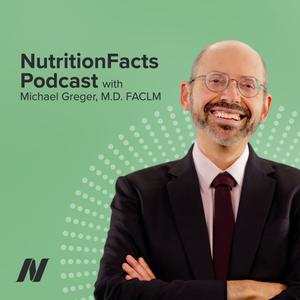 Nutrition Facts with Dr. Greger
Nutrition Facts with Dr. Greger
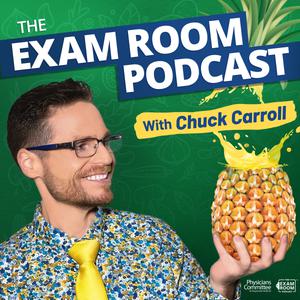 The Exam Room by the Physicians Committee
The Exam Room by the Physicians Committee
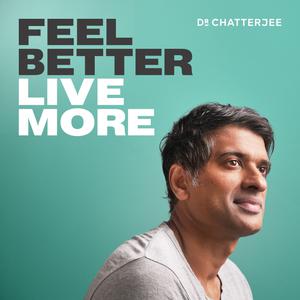 Feel Better, Live More with Dr Rangan Chatterjee
Feel Better, Live More with Dr Rangan Chatterjee
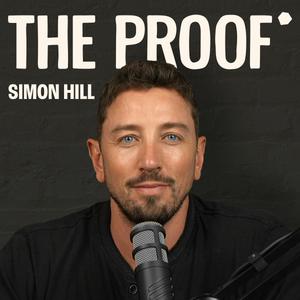 The Proof with Simon Hill
The Proof with Simon Hill
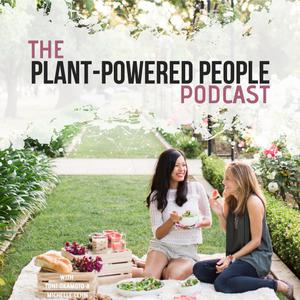 Plant-Powered People Podcast
Plant-Powered People Podcast
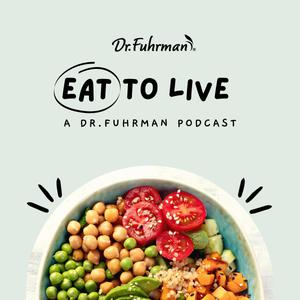 Eat to Live
Eat to Live